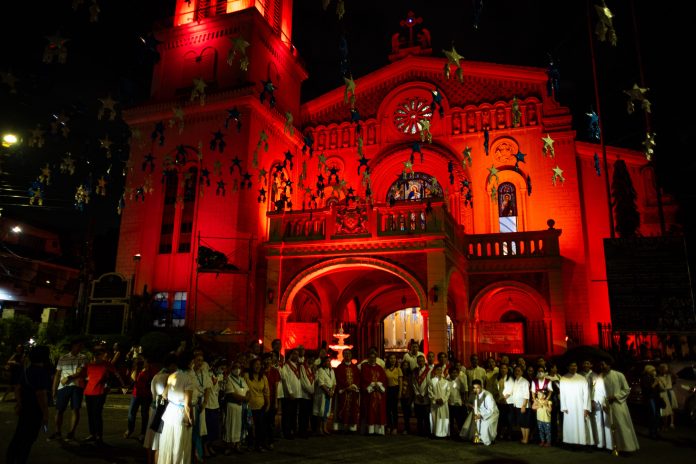I wonder if you know that one of the songs composed by Paul Simon has a part that alludes to our first reading today. I am referring to the song sung by the famous duet: Simon and Garfunkel, The Sound of Silence. The last verse of that song says:
“And the people bowed and prayed
To the neon god they made
And the sign flashed out its warning
In the words that it was forming
And the sign said, ‘The words of the prophets are written on the subway walls in tenement halls’
And whispered in the sounds of silence.”
Of course, Paul Simon has modernized the biblical text. Instead of the god of stone and clay worshipped by the Babylonians, he talks about the neon gods made by human hands which people bow and pray to.
He says the neon gods flash signs and form words that communicate a warning saying, “The words of the prophets are written on subway walls and tenement halls…” much like the protest graffiti written by modern activists like the Palestinian painter Banksy on the walls surrounding Bethlehem.
That famous Palestinian painter had one of his paintings of a girl with a balloon sold at an auction in New York. After the auctioneer announced that the painting would go to the highest bidder, to the horror of the bidders, a machine behind the painting roared and the painting worth millions of dollars was shredded right before the shocked eyes of the crowd of art vultures.
He did it to make a political statement—much like what the young prophet Daniel did when he refused the fat reward being offered by King Belshazzar while giving his statement anyway, the famous three-line writing on the wall: mene, thekel, peres. MENE, God has numbered the days of your kingdom and put an end to it; TEKEL, you have been weighed on the scales and found wanting; and PERES, your kingdom will be divided and given to the Medes and Persians.
In our Gospel today, Jesus says to his disciples, “People will seize and persecute you, they will hand you over to the synagogues and to prisons, and they will have you led before kings and governors because of my name.”
But he explains that these occasions are just meant to be our opportunities to take part in his mission. He says these events are meant to ”lead to your giving testimony.” In Greek, the word is MARTURIA—witnessing, giving testimony, pagpapatotoo, which is the work of the prophets who write their messages on walls.
It comes with an assurance: “you are not to prepare your defense beforehand, for I myself shall give you a wisdom in speaking that all your adversaries will be powerless to resist or refute…”
What does he mean? Well, in Luke 12:12 , he says, “…the holy Spirit will teach you at that moment what you should say.”. Meaning, it is not what the prophet wants to say that matters but what the Lord wants to say through him. He is called to serve as a mouthpiece—yes, but a willing and conscious mouthpiece. A verse from Jonathan Livingstone Seagull says that: “Be as a page that aches for a word which speaks of a truth that’s timeless…”
We remember today, Red Wednesday, the countless prophets of this world whose timeless words are written with their blood in history. We call them martyrs because of their courageous witnessing that could not be silenced. We have a whole cloud of witnesses in our history. Almost all the apostles died a martyr’s death. We recall the early Christians who were crucified or fed to lions in Roman amphitheaters while the crowds watched and amused themselves. We recall the holy martyrs of Japan, Korea, and Vietnam, Uganda who were beheaded, or tortured in wells. We remember Thomas More and Edmund Campion of England, the Carmelites of Compiegne, and thousands of others who had been guillotined.
Our two Filipino saints are lay martyrs— San Lorenzo Ruiz and San Pedro Calungsod. Their blood had watered the seeds of the Christian faith that continue to germinate and bear fruits until this day and age.
But in all humility, even as we pay tribute to Christians who have been persecuted and oppressed, we must also bow with shame as we remember those who call themselves Christians but have been instrumental in the oppression and persecution of their fellow Christians.
We bow with remorse and beg the Lord’s mercy on those who call themselves Christians but have approved of violence and extrajudicial killings, those who have been complicit in the weaponization of the law and the implementation of unjust State policies against their perceived political enemies, those who have inflicted untold sufferings on their fellow human beings, and justified these in the name of God and religion.
Homily of Bishop Pablo Virgilio David of Kalookan on Red Wednesday, 29 Nov. 2023, Lk 21:12-19









